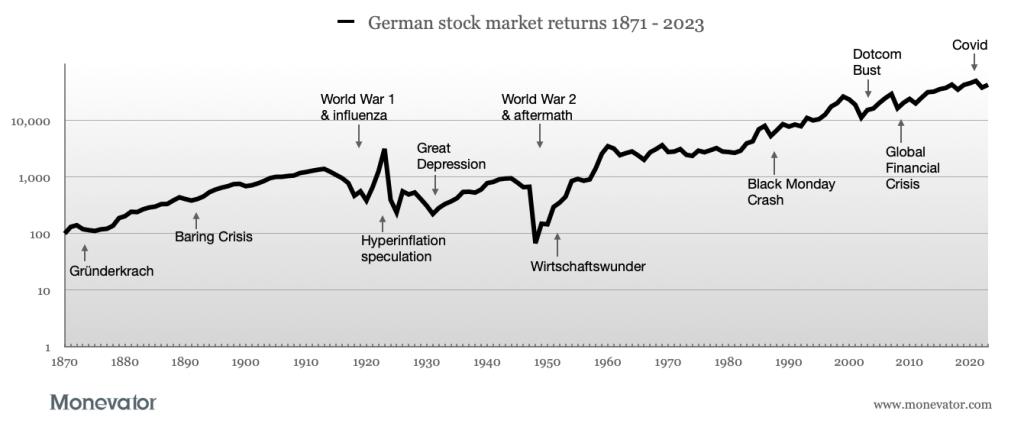
What caught my eye this week.
Fund managers have bemoaned their benchmarks for as long as I’ve been investing – or at least whenever they’re lagging behind them.
Large cap UK fund managers will try to convince you to ignore BP or Shell or some other big energy stock in the UK market if the oil price soars, for example.
Meanwhile hedge fund fans invariably ask you to look past their (nowadays typically middling) gains to focus on risk taken or volatility endured – yet as an industry they seem to do this less at the marketing stage and more for the post-mortems.
I could go on, especially given that me and nearly everyone else I know who picks stocks are mentally side-stepping our benchmarks now, too.
Even some dedicated passive investors are making excuses.
Size matters
The cause of this angst is of course the top-heavy US market – and the triumph of the so-called Magnificent Seven tech giants – which we touched upon the other week (see The 7/93 portfolio).
For those napping at the back, here’s an update via John Authers of Bloomberg:
Startling, but some still say there’s nothing to see here. That this sort of concentrated performance happens all the time.
And it’s true that in any particular investing era, a few large winners do tend to be stomping around the top of the index like they own the place.
But what is unusual with this generation of ‘inevitables’ is that they’ve kept at it. Their 2020-2021 market-beating advance was repeated right after their 2022 swoon.
Big but blundering
It’s rare for such dominance to go on so long. As GMO points out in its latest quarterly letter [gated], while the largest firms by no means consistently underperform, over the long-term they do tend to trail the average stock:
Eventual lagging makes intuitive sense. Trees don’t grow to the sky and all that.
Of course mildly big companies become giant companies regularly. Winners do win.
But eventually size, complexity, missed expectations, and disruption by upstarts tends pulls down their future gains.
That is exactly why the news is full of stories about Elon Musk and Mark Zuckerberg and not John D. Rockefeller the 7th or the CEO of the Dutch East India Company.
And looking at GMO’s graph, whenever it did seem like the biggest trees might keep bolting heavenward and then they didn’t after all, the aftermath was not pretty. Think the Dotcom boom and bust, or the crash of the early 70s.
So it’s all of legitimate concern.
Weight for it
I’ll save my musings on what might undo the dominance of the Magnificent Seven for another day. (It strikes me as potential Moguls material…)
But in the meantime, even passive investors are getting antsy.
Our own passive guru The Accumulator wavered from the true path – aka buy a global tracker for all your equities – in devising his No Cat Food portfolio this week.
And judging from the Monevator comments, plenty of you have similar concerns.
The principle worry for everyday folk is of course that our portfolios will take one between the eyes if and when the big winners finally fall (or fade) from grace.
No wonder! The US market now makes up 70% of a global tracker, and Bloomberg’s graph above illustrates where much of its gains have been coming from recently.
But for those of us who play the naughty active game – whether privately or professionally – there’s also the matter of keeping score.
Which brings me back to the benchmark blues I talked about at the start of this post.
Bench pressed
Fund managers are judged on their outperformance, or more likely the lack of it. The rest of us naughty active investors wonder what our hobby is costing us.
Conor Mac put this well on his Investment Talk blog this week:
So what’s a good compounded annual growth rate (CAGR) for 40 years of work, assuming you invested $10,000 per year?
Opinions on this matter vary, but for the sake of argument let’s say that buying a hypothetical index fund and sitting in it for 40 years would have returned 8% compounded annually.
Suppose after 40 years of hard work you look at your portfolio report and see that you generated a 6% compounded annual return.
One perspective is that you made yourself a small fortune of ~$1.4 million.
Another is that you lost ~$1.4 million because if you had instead invested in the fund you would have earned ~$2.8 million and 4.75 years of your life back.
This isn’t just about ego and beating an arbitrary benchmark, it’s about maximising return and considering opportunity costs.
People want to know if what they are doing is worth their time.
Of course the trite answer is the best stockpickers should have bought the Magnificent Seven companies, sat on them, and smashed their S&P 500 benchmark.
The Mag Seven are undoubtedly some of the greatest (/ least regulated / most monopolistic) companies of all-time, so I’m not being quite as glib as it sounds.
Alas, the best stockpickers also tend to be students of history – and a decent majority believers in reversion to the mean. This made it hard to buy and hold the world’s first $1 trillion listed companies on their way to being the first $3 trillion listed companies.
At least that’s what I’ve been telling my girlfriend. Who has little interest in my returns and even less so in my investing. I guess it’s been on my mind.
It shifts all the time, but I’ve got only 35% or so in US equities presently. No wonder I’m already lagging in 2024.
(And no honey we can’t finally go to the Maldives this summer after all.)
Of course another flavour of active traders do ride momentum – and they would have been buying these stocks accordingly.
Momentum works brilliantly until it doesn’t though, and it’s more easily done within a computer model than lived in reality in my experience.
At least that’s my excuse.
Passive violence
To return to passive investing, its critics also hold up momentum as one of their grudges against index-tracking (and never mind indexing’s superior returns).
Veteran hedge fund manager David Einhorn has even been arguing that the markets are ‘fundamentally broken’ due to passive investing:
“All of a sudden the people who are performing are the people who own the overvalued things that are getting the flows from the indexes. You take the money out of value and put it in the index, they’re selling cheap stuff and they’re buying whatever the highest multiple, most overvalued things are in disproportionate weight,” [Einhorn] said.
Then the active managers participating in that part of the market get flows and they buy even more of the overvalued assets.
As a result, stocks, rather than “reverting toward value” instead “diverge from value,” Einhorn said. “That’s a change in the market and its a structure that means almost the best way to get your stock to go up is to start by being overvalued.”
Personally I don’t believe adaptive and complex systems like markets get ‘broken’. Rather, I suspect if there’s a reckoning due then it’s merely been postponed.
But Einhorn is smart and time will tell.
Stay on target
In the meantime Einhorn says he’s looking to those running his cheap and unloved companies to return capital to shareholders via buybacks and dividends for his gains.
Which doesn’t actually sound too new-fangled to me. But it is more honest than changing your benchmark when you’re down, so one and half cheers I say.
Also, Einhorn might take heart from the conclusion of GMO’s letter. Its wonks argue that active investors have taken their pain, and sooner or later they’ll enjoy the gain:
Time will tell if the Magnificent Seven turn out to be as fallible as the Nifty Fifty or the TMT darlings that preceded them at other notable times of mega cap outperformance, but the history of mega caps when they are trading at a substantial premium to the rest of the market is particularly poor.
If the U.S. equity market becomes less concentrated – our bet for the next decade – skilled active managers are poised to have a decade for the books.
Allocators who stick to basics, reminding themselves of the virtues of diversification, stand to benefit handsomely.
That would be nice, wouldn’t it?
Maybe next year…
Have a great weekend.
From Monevator
Decumulaton strategy: the No Cat Food Portfolio – Monevator [Members]
What your retirement living standards could look like – Monevator
From the archive-ator: 10 tips for Britain’s blighted young things – Monevator
News
Note: Some links are Google search results – in PC/desktop view click through to read the article. Try privacy/incognito mode to avoid cookies. Consider subscribing to sites you visit a lot.
Barclays to buy Tesco Bank in £600m deal – BBC
UK retirement age may need to rise to 71, say experts… – Guardian
…but others are sceptical and argue it’s a ‘blunt tool’ – Which
Woodford scheme of arrangement sanctioned by High Court – Investment Week
UK house price rises to highest for a year in January, says Halifax – BBC
What’s happening to buy-to-let mortgage rates? – Which
Products and services
Chip launches its first cash ISA, paying a 4.75% rate – This Is Money
Five ways to help your child buy their first home – Which
UK lender offers long-term mortgages that cut rates over time – Guardian
Get between £100 and £5,000 cashback when you open a SIPP with Interactive Investor before 29 Feb. New SIPP customers only. Minimum £10,000 account value. Terms apply. Capital at risk – Interactive Investor
Six reasons not to switch your bank account – Which
Shedding light on the finances of solar panels [Search result] – FT
Obsessed with the markets? Cutting-edge data platform Koyfin is offering Monevator readers a seven-day gift of Koyfin Pro, as well as a special pricing offer of 20%-off all Koyfin plans. Sign-up with our link – Koyfin
Portfolio Charts now enables you to visualise strategy returns over time – Portfolio Charts
Barclays Smart Investor scraps £4 minimum monthly fee and fund dealing charges – This Is Money
Tips and tricks to find cheap flights – Be Clever With Your Cash
Homes for sale in urban villages, in pictures – Guardian
Apple Vision Pro mini-special
A review of the Apple Vision Pro – The Verge
Is spatial computing the future of work? Not yet – Stratechery
A day wearing Vision Pro [Video, check out the cooking at 4:14] – WSJ
Bullish for Apple, bearish for society – A Wealth of Common Sense
Comment and opinion
Paying into a pension can dodge the 60% tax trap for £100K+ incomes – This Is Money
How to buy a house these days [US but relevant] – Mr Money Mustache
25 investing mistakes that you can easily avoid – Darius Foroux
Time to tax billionaires [Search result] – FT
No Worries? More thoughts on FIRE – The Italian Leather Sofa
The most overrated things in personal finance – Of Dollars and Data
Why you’re better off not borrowing – The Atlantic via MSN
A bullish take on Bitcoin – Advisor Perspectives
Good-looking parents? You probably earn more money – MarketWatch
Sandpiles and market unpredictability – Novel Investor
The total return rollercoaster – Advisor Perspectives
Naughty corner: Active antics
Which type of investor are you? – Behavioural Investment
Pods, passive flows, and punters – Albert Bridge Capital
The investor experience with thematic funds – Klement on Investing
Using valuation metrics to navigate the cycle – Topdown Charts
Better than they were, but bonds are still too expensive – Morningstar
Are the Magnificent Seven too dear? [PDF] – Goldman Sachs
Kindle book bargains
How Not To Be An Antiques Dealer by Drew Pritchard – £0.99 on Kindle
I Will Teach You To Be Rich by Ramit Sethi – £0.99 on Kindle
The Tipping Point by Malcolm Gladwell – £0.99 on Kindle
Money Box by Paul Lewis – £1.99 on Kindle
Environmental factors
Europe’s deepest mine to become a giant battery – Independent
Should ESG investing be criminalised? – Morningstar
The Earth is getting – literally – greener – Vox
Meet the world’s most amazing tiny creatures – Guardian
The rise of ESG among (wealthy) retail investors – Klement on Investing
Robot overlord roundup
AI is quietly changing everyday life [US but relevant] – Politico
How Microsoft’s lead is showing up – Axios
Brexit going as great as ever mini-special
Young people’s desertion of conservatism is not a global phenomenon [Search result] – FT
Italian man removed from UK despite post-Brexit Home Office certificate – Guardian
Penury and decay mark Brexit’s miserable anniversary – Guardian
Brexit dividing opinions and families four years on – BBC
Off our beat
Our complicated relationship with ‘stuff’ – Root of All
‘Enshittification’ is coming for absolutely everything [Search result] – FT
Have the Dutch found the answer to the burnout problem? – Guardian
The surprising resilience of the Russian economy [Search result] – FT
Chris Dixon: crypto can save the Internet – Semafor
So you want to be a centenarian? – A Teachable Moment
What your brain is doing when you’re not doing anything – Quanta
Everyone’s a sellout now – Vox
And finally…
“Crowds are often surprisingly wise – the market can be right even when everyone who makes it up is individually wrong.”
– Lee Freeman-Shor, The Art of Execution
Like these links? Subscribe to get them every Friday. Note this article includes affiliate links, such as from Amazon and Interactive Investor.
The post Weekend reading: We all feel the pain of active fund managers now appeared first on Monevator.



